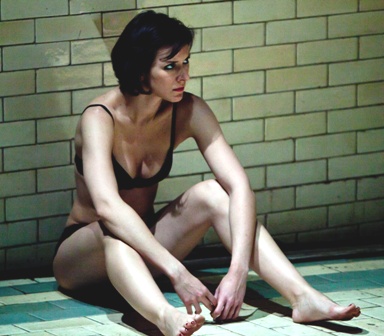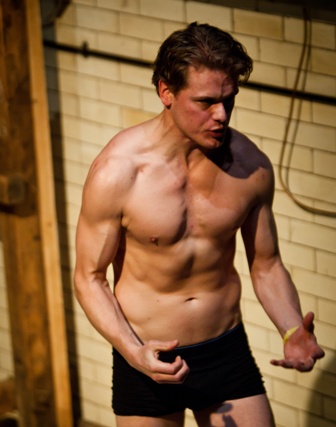
Louise Ford in the role of Elsa
A night in the tiles
When The Leisure Review found out that somebody was putting on a play in a swimming pool we looked for a theatre-goer who knew about swimming or a pool attendant with a thespian bent. In Sarah Beckett and John Webber we found both.

Louise Ford in the role of Elsa
Offstage Theatre’s multimedia production of Amphibians, a Steve Waters play about a pair of elite swimmers, tackles all of this head on and overcomes it admirably. Offstage specialise in producing theatre events in venues not traditionally associated with the performing arts and, although staged in the Bridewell Theatre off London’s Fleet Street, this is unlike any other theatre. The Bridewell occupies a building that was once a public swimming bath constructed in the 1890s and the real wonder is that, for this production, the original Victorian pool underneath has been revealed.
Designer Georgia Lowe puts the audience on raked spectator-style seating in the shallow end of the pool. In the deep end is a platform on which, around which and underneath which the action occurs. The walls have been stripped back to show the original tiles and the beautiful ironwork of the balconies can be seen overlooking everything. Lit with precision by Richard Williamson to resemble Victorian gas light, the effect on the audience as they arrive is magical and immediately evocative of the play’s setting; it even smells right.
We witness a meeting between Elsa and Max, now approaching 30, who were once team-mates and romantically involved. She now uses the pool only to play with her toddler whereas he still chases the qualifying times and the glory. Waters doesn’t avoid the traditional sport trajectory, its arrow pointing to the crucial event with its winner or loser. However, it is testament to his skill that he draws us into more profound territory and keeps us guessing whether the characters are winners or not until the very end. By using flashbacks he shows how their relationship got to where it is, rather than just what got them to the Olympic Games.
We also discover what drew them to the water in the first place. For Elsa, it was playing with her father in the splash pool as a kid. This relationship with her father feeds her swimming, to the point that when he is absent from a meet she almost loses because she is looking for him among the spectators. For Max, a daredevil act of jumping into a river which gave him a sense of freedom drove him to the pool to replicate the feeling. Ultimately these differences drive them apart, with Elsa wanting to have relationships (“I need people more than I thought”) and Max finding his hunger for success insatiable (“I made the world’s jaw drop”).
Olympic standard swimmers were interviewed as research for the play and the flashback episodes do have a strong ring of authenticity. Gathered around the central pair is a chorus of performers who play the also-swams with great sensitivity and individuality. At times a haunting presence, they intermittently throw out memorable, poignant statements: “She says I choose to make mistakes. How can I choose to make mistakes?” Movement director, Kate Sagovsky, has done an excellent job with the group in showing the grind of training and its physical toll. In one set piece the chorus work in unison, spaced equally, to Danny Saleeb’s strong score, until idiosyncratic moves from individuals creep in. At times someone pulls out completely to perform a small solo in the background, demonstrating that, for the most part, your greatest competition as an athlete is with yourself.
The play has a keen awareness of the exceptional nature of elite sport: how the shivering 14-year-olds we meet in flashback must separate themselves from “planet mediocrity” and the “nobodies” to attain mythical status; how the Coach has destroyed his own life in his chase for excellence; and how in Arion, the play’s weakest concept, we see humankind’s primal connection with water being evoked to drive success: “You are not apes. You are amphibians.”
The Coach, played with just the right amount of grizzled machismo by Jan Knightly, takes centre stage in one of the highlights of the show. When confronted by Max as to why he didn’t make it, the Coach discloses that he did indeed qualify for the Olympics, but, unable to sleep the night before the race, left the village to go clubbing to celebrate being the “potential man”. His deep desire to be “normal”, without thinking of the future, cost him his chance. Here, performance, movement and music combine in this special space to create a charged theatrical montage.
The central performances are convincing: Louise Ford’s Elsa balances the brittleness of a champion with the earthiness of someone who craves relationships over the pool; Sam Heughan as Max demonstrates the priggish arrogance of self-belief and how it can teeter on the edge of self-destruction. They are both at their best in showing the tentative relationship between them as teenagers and the doubts of youngsters faced with having to choose their own destiny.
Using the unique space so effectively, with powerful performances, music, design and choreography, along with ghostly video projections, Cressida Brown has created a rich, textured theatre experience. If anything, the production’s tendency towards an overly emphatic delivery in the main roles means that ultimately the play’s pathos does not find full expression and it is not as moving as it could be. Likewise, the acoustics swallow up the odd line if not spoken carefully. Minor miss-steps, perhaps, as this is a classy evening – one that is revealing in its portrayal of the type of people drawn to elite sport, but revealing too of the choices we all face in the knowledge that we only have one shot at this life.
After 90 minutes without an interval you may wish you had more than just municipal bath towels for seat padding (lovely touch) but, if you get the chance to see theatre and swimming pools conjoined, take the plunge and give it a go.
Sarah Beckett, a former pool attendant who acts, and John Webber, an actor who swims, are commercial training consultants who specialise in using role play to bring greater realism and consistency to the training environment.
The Leisure Review, February 2011
© Copyright of all material on this site is retained by The Leisure Review or the individual contributors where stated. Contact The Leisure Review for details.
Download a pdf version of this article for printing
